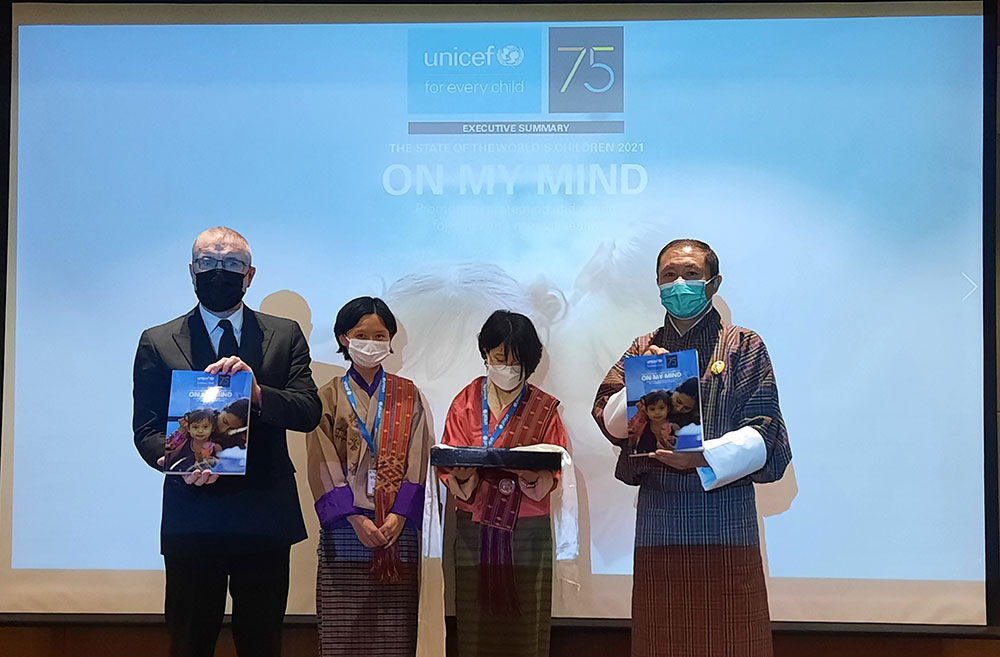UNICEF’s report on the state of the world’s children calls for opportunities to promote good mental health for every child
Younten Tshedup
Dhaka, Bangladesh, 1994: A Bhutanese student was mentally disturbed following a violent incident at the medical college, jeopardising his dream of becoming a doctor.
The student sought immediate help, both medical and religious. He completed his studies. The student, current foreign minister, Dr Tandi Dorji, sharing his experience at the launch of UNICEF’s The State of the World’s Children 2021 report yesterday said timely intervention is the key to preventing and alleviating mental illness.
While health officials say that the awareness on mental health issues have encouraged people to come forward for help, there are many who still hesitate to talk of the issue, despite being severely affected.
Lyonpo said that although Bhutan started its mental health programme more than two decades ago, cases are still on the rise. Despite having a dedicated mental health programme, he said it has not helped those in need.
“Mental health issues are something that we don’t talk about often.” For a long time, he said, people accepted anxieties and fear as being merely normal. “We say these people are short-tempered and do nothing about it, if not avoid them. And if your illness is a little serious, he or she is branded as ‘mad’,” he said, adding that the stigma around mental illness and people’s attitudes hinder addressing the issue.
UNICEF Bhutan Representative, Dr Will Parks, said that more than a year and a half into the Covid-19 pandemic, the impact on children and young people’s mental health and psychosocial well-being is taking a toll.
He said that the uncertainty, isolation, and loss around Covid-19 are impacting children, young people, and caregivers globally. “We are living through the biggest shared psychological distress since the Second World War.”
Dr Will Parks said that UNICEF’s flagship publication, “The State of the World’s Children” this year focuses on mental health, with an emphasis on how risk and protective factors at home, school, and community shape mental health outcomes for children and adolescents. “As global awareness of mental health issues and demand for action grow, we now have a unique opportunity to promote mental health and well-being for every child, protect vulnerable children, and care for children facing the greatest challenges.”
In an online study that UNICEF Bhutan and the Department of Youth and Sports conducted last month, 2,185 people aged between 10-24 years reported being sad. 2,085 said that they were stressed and 543 of the respondents reported being depressed in the past few months. Also, 3,361 respondents said they would like to be asked how they were doing and have someone be a listening ear to them. A total of 7,521 children were interviewed for the study.
Dr Will Parks said: “No one should have to deal with mental health challenges on their own. Yet, far too many children, young people, and adults still do. We can change that. That change starts with one moment, one conversation, one question.”

On My Mind
Along with the report, the Ministry of Education and UNICEF Bhutan also launched the ‘#OnMyMind’ campaign to increase awareness of mental health and help strengthen support-seeking behaviour among children and adolescents.
Lyonpo Dr Tandi Dorji, the Chair of the National Commission for Women and Children, said that of the many factors triggering mental health issues in the country, the biggest concern among the youth was the lack of care and support given to them.
“As paediatricians, we tried to educate parents on the importance of recognising early signs and symptoms of mental health issues. But it was easier said than done, as children didn’t usually show or speak about such problems openly,” he said.
Lyonpo said that Her Majesty The Gyaltsuen has also expressed concerns over the growing mental illness cases in the country and has commanded the government to come up with a comprehensive package to address the issue at the earliest. “Mental illness in Bhutan has been hidden for too long. We have not been addressing or talking about it enough. So let us start today, and let us work together to make a brighter future for our children.”
Dr Will Parks said that given the complexities of the issue, addressing poor mental health will not be without challenges. “But Bhutan has shown the world the impossible. Through the compassionate leadership of His Majesty The King, the Covid-19 response efforts are exemplary, and the people’s happiness and wellbeing are at the core of all your development pursuits.”
“Bhutan is a beacon of hope for the region and the world. The pursuit of good mental health by creating a whole of government, whole of society, and whole of life cycle-enabling environment would not be impossible. Not for Bhutan.”
If you, or someone you know, have been affected by mental health issues or self-harm, call 112 to seek support .


